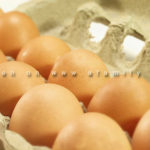Eggs are a nutritious food, offering a wealth of high-quality protein that is easily absorbed by the body. They are also a good source of various vitamins and minerals, including vitamin A, folate, vitamin B5, vitamin B12, and vitamin B2, as well as phosphorous, calcium, and zinc. While eggs do contain cholesterol, it is important to note that this dietary cholesterol does not raise blood cholesterol levels.
In fact, including eggs in your diet is a great way to boost your HDL levels, the “good” cholesterol that helps reduce the risk of cardiovascular diseases, stroke, and other health issues. According to research, consuming two eggs daily for six weeks can increase HDL levels by 10%.

Choline, another important nutrient found in eggs, plays a crucial role in cell membrane structure and the production of signaling molecules in the brain, regulating various functions.
Eggs are not only nutritious but also versatile and easy to cook, making them a staple in many households. However, proper storage is essential to maintain their quality and freshness. Contrary to popular practice, the door of the refrigerator is not the ideal place to store eggs.
Vlatka Lake, a business director at Space Station, a company specializing in storage solutions, explains that the door is the area with the most unstable temperature due to frequent opening and closing. Storing eggs here can lead to quicker spoilage. Additionally, the constant movement can cause vibrations that affect the eggs’ quality.
Dr. Ta Tung Duy from the Vietnam Institute of Applied Medicine also emphasizes that the varying temperatures and frequent opening and closing of the door create an environment conducive to bacterial growth, which can compromise the protective coating of the eggs, increasing the risk of contamination and spoilage.

Illustration
The recommended way to store eggs is to keep them in dedicated trays or containers with lids to prevent the absorption of odors and flavors from other foods in the refrigerator. Place the egg tray/container in the middle or deeper sections of the fridge, maintaining a stable temperature of below 20 degrees Celsius.
TS.BS Phan Bich Nga from the National Institute of Nutrition offers additional insights into egg storage. Freshly laid eggs are coated with a pinkish powder that acts as a protective barrier against bacterial invasion and enhances their hatchability. However, due to the proximity of eggs to bird droppings during laying, they can harbor various bacteria, including salmonella, which has a high potential for causing foodborne illnesses.
Therefore, it is crucial to clean eggs properly before storing them in the refrigerator, especially if they are purchased from local markets. A quick wash with diluted salt water or plain water, followed by thorough drying, is recommended. However, eggs bought from supermarkets, which have already undergone cleaning, do not require additional washing.
Tips for Identifying Fresh and High-Quality Eggs
– Inspect the Shell
Examine the shape, color, and transparency of the eggshell. Fresh, high-quality eggs have intact shells with a matte finish and a fine, powdery coating. The color should be bright, and there should be no cracks, indentations, or seepage of the egg white. Additionally, the shell of a fresh egg feels slightly rough to the touch.
– Listen for a Clear Sound
Gently tap the eggs together or lightly shake them. Fresh, high-quality eggs will produce a crisp, clear sound when tapped, and there should be no rattling or liquid movement when shaken.
– Smell for Freshness
Breathe onto the eggshell and then smell it. Fresh eggs will have a faint odor of lime, while stale eggs may have a slight musty smell. Rotten eggs will emit a strong, unpleasant odor.




































